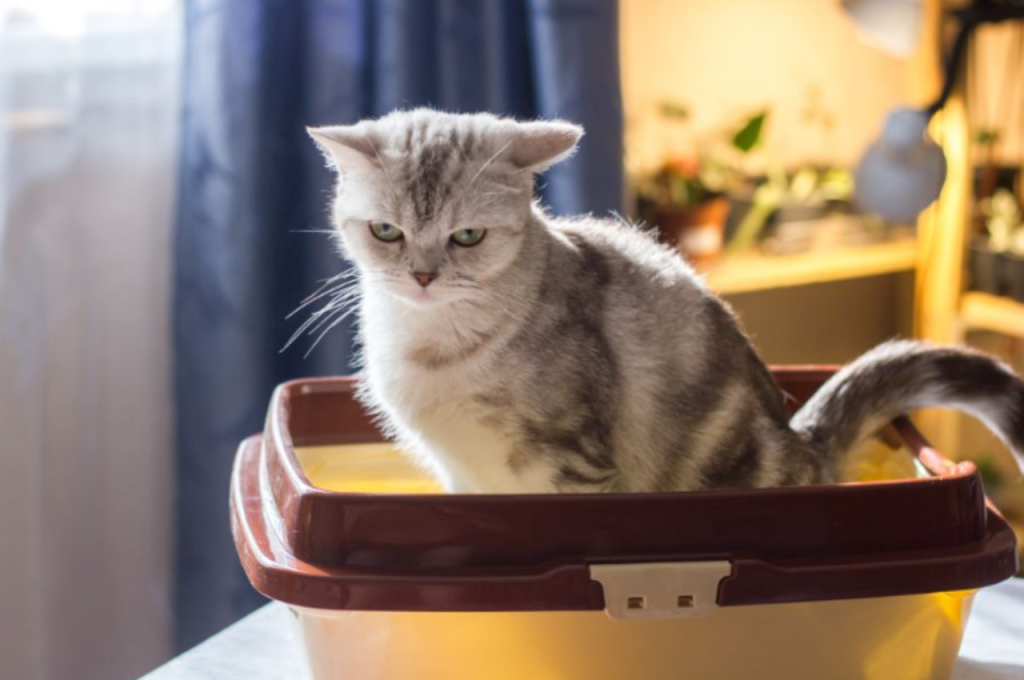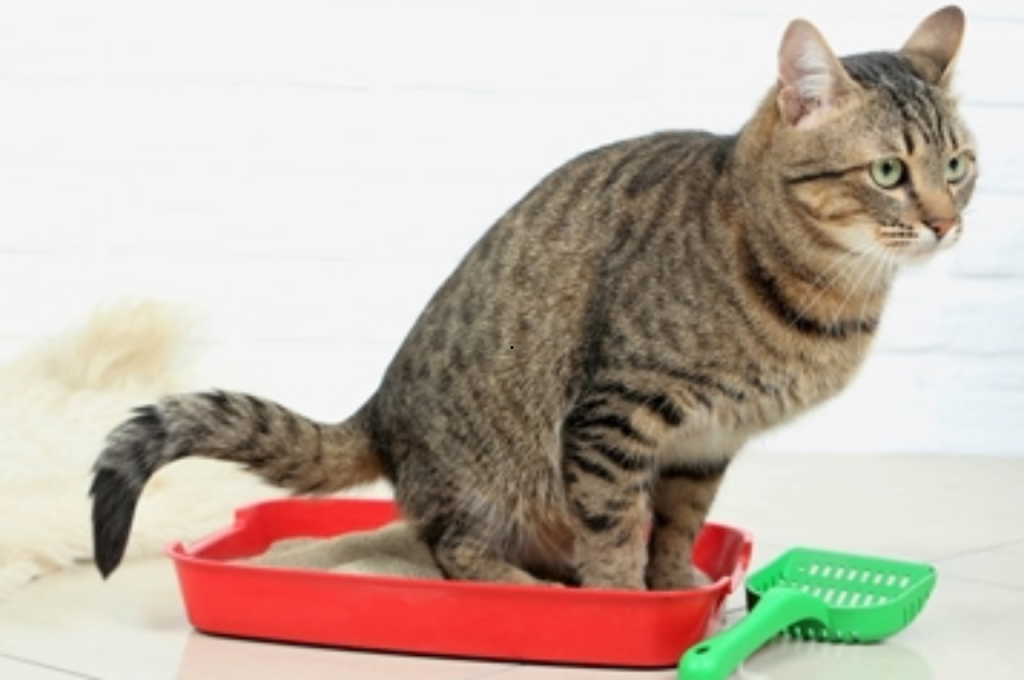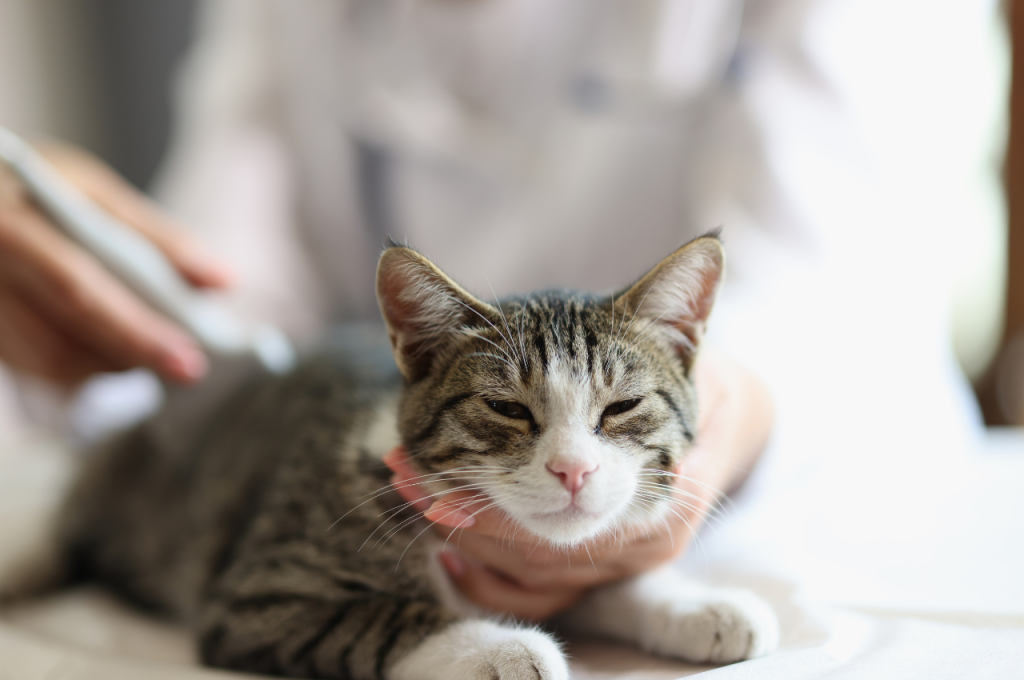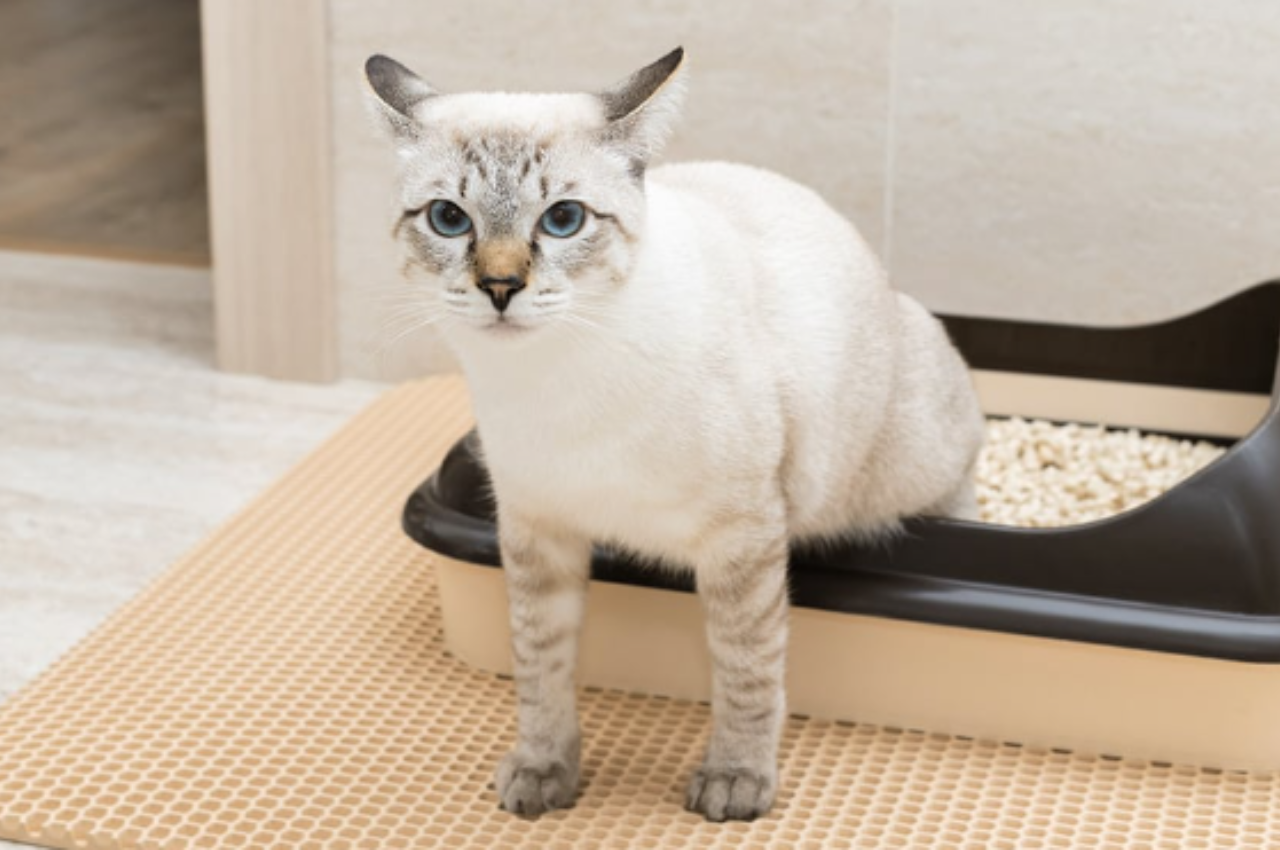To help a constipated cat, offer more water, increase fiber intake, and consult a vet promptly. Constipation in cats can be uncomfortable and even dangerous if left untreated.
It is essential to address the issue promptly to ensure your cat’s well-being. By following a few simple steps, you can help alleviate your cat’s discomfort and improve their digestive health. In this blog post, we will explore effective ways to assist a constipated cat, including dietary changes, hydration tips, and when to seek professional veterinary care. Let’s dive into how you can support your feline friend through this common but concerning issue.
Recognizing Constipation in Cats
Identifying constipation in cats involves observing signs like reduced or no bowel movements, straining in the litter box, and dry, hard stools. To help a constipated cat, increasing water intake, adding fiber to their diet, and regular exercise can promote bowel movements and alleviate the discomfort.

Common Symptoms
If you suspect that your cat might be constipated, there are several common symptoms to look out for. These signs can indicate that your feline friend is experiencing difficulty in passing stool and may require your help. Keep an eye out for the following:
- Infrequent or no bowel movements
- Straining or crying while trying to defecate
- Dry, hard, or small stools
- Loss of appetite
- Lethargy or decreased activity levels
- Vomiting or retching
- Bloated abdomen
- Visible discomfort or pain
- Excessive grooming around the anal area
These symptoms can vary in severity, but if you notice any of them persisting for more than a day or two, it is essential to take action to alleviate your cat’s discomfort.
Dietary Solutions
To help a constipated cat, dietary solutions such as adding fiber to their diet or providing canned food can promote regular bowel movements. Increasing water intake and incorporating probiotics can also aid in relieving constipation in cats.
How to Help a Constipated
Cat Constipation is a common issue among cats, and it can be caused by various factors, including dehydration, lack of exercise, and poor diet. While some cases of constipation may require veterinary intervention, many can be resolved with simple dietary changes. In this post, we’ll discuss some dietary solutions that can help alleviate constipation in your feline friend.
- High-Fiber Foods: One of the most effective ways to prevent and manage constipation in cats is to increase their fiber intake. High-fiber foods help to bulk up the stool, making it easier to pass. Some great sources of fiber for cats include:
- Canned pumpkin: Pumpkin is a great source of soluble fiber, which can help regulate the digestive system. You can mix a small amount of pumpkin into your cat’s food, or offer it as a treat.
- Psyllium husk: Psyllium husk is a natural laxative that can help soften the stool and promote bowel movements. You can sprinkle a small amount of psyllium husk over your cat’s food, or mix it with water and administer it orally.
- Green beans: Green beans are a low-calorie, high-fiber food that can help keep your cat regular. You can offer them fresh or cooked, but make sure to remove any seasonings or additives.
Proper Hydration
Dehydration is a common cause of constipation in cats, so it’s essential to ensure that your cat is drinking enough water. Encourage your cat to drink water by providing a clean, fresh bowl of water at all times. You can also add water to your cat’s food or offer wet food, which has a higher moisture content than dry food.
Supplements That Can Help
In addition to high-fiber foods and proper hydration, there are several supplements that can help alleviate constipation in cats. Here are a few options:
- Probiotics: Probiotics are beneficial bacteria that can help regulate the digestive system and promote bowel movements. You can find probiotics in capsule form or in certain types of cat food.
- Laxatives: If your cat is severely constipated, your veterinarian may recommend a laxative to help soften the stool and promote bowel movements. Laxatives should only be used under veterinary supervision.
- Digestive enzymes: Digestive enzymes can help break down food and improve digestion, which can help prevent constipation. You can find digestive enzyme supplements in capsule form or in certain types of cat food.
In conclusion, dietary solutions can be an effective way to help a constipated cat. By increasing your cat’s fiber intake, ensuring proper hydration, and using supplements as needed, you can help keep your feline friend healthy and comfortable. As always, if your cat is experiencing severe or chronic constipation, be sure to consult with your veterinarian for proper diagnosis and treatment.
Exercise and Physical Activity
Encourage your constipated cat to stay active with regular exercise and physical activity. Engage them in playtime and provide opportunities for movement to promote digestion and alleviate constipation.
If your feline friend is struggling with constipation, there are various ways to help them feel better and get their digestive system back on track. Exercise and physical activity can be effective in aiding constipation and promoting regular bowel movements. Here are some ways you can encourage your cat to exercise and move more:
Interactive Play
Interactive play is an excellent way to stimulate your cat’s physical activity and encourage them to move around. Cats are natural hunters, and playing with toys that mimic prey can help them burn off energy and stay active. Some interactive toys you can try with your cat include feather wands, laser pointers, and catnip-stuffed mice.
Encouraging Movement
It’s essential to make sure your cat has enough space to move around and exercise comfortably. Encourage your cat to climb, jump, and explore their environment. You can also create an obstacle course for your cat to navigate, using boxes, tunnels, and furniture. Additionally, try to provide your cat with various scratching posts and climbing structures to promote movement.
Additional Tips
In addition to interactive play and encouraging movement, there are other ways you can help your constipated cat exercise and stay active. Here are some additional tips:
- Take your cat for short walks on a leash, if they are comfortable with it.
- Use food puzzles or treat-dispensing toys to encourage your cat to move and play.
- Make sure your cat has access to fresh, clean water at all times.
- Consult with your vet about dietary changes or supplements that can aid constipation.
By incorporating exercise and physical activity into your cat’s routine, you can help them feel better and maintain healthy bowel movements. Remember to consult with your vet if your cat’s constipation persists or worsens.
Litter Box Habits
Help your constipated cat by ensuring they have access to a clean and comfortable litter box. Choose a litter that is easy for your cat to dig and bury their waste, and consider adding a bit of pumpkin or fiber to their diet to aid in digestion.

Cleanliness and Accessibility
Ensure the litter box is clean and accessible to prevent constipation in cats.
Types of Litter
Choose appropriate litter such as clumping, scented, or natural options.
Home Remedies
Constipation can be a common issue for cats, but there are several home remedies that can help provide relief. These remedies are often gentle, and natural, and can be effective in alleviating your cat’s discomfort. Let’s explore some home remedies that can help your constipated cat feel better.
Gentle Belly Massage
A gentle belly massage can help stimulate your cat’s digestive system and encourage bowel movements. To perform a belly massage, place your cat in a comfortable position and use gentle circular motions on its abdomen. Be mindful of your cat’s comfort and stop if it shows any signs of distress. This technique can help relieve constipation and promote regular bowel movements.
Natural Laxatives
Natural laxatives, such as pumpkin puree, can be beneficial for relieving constipation in cats. The high fiber content of pumpkin can aid in digestion and soften stool, making it easier for your cat to pass. You can mix a small amount of pumpkin puree into your cat’s food to help alleviate constipation. Always consult your veterinarian before introducing any new foods or remedies into your cat’s diet.
Over-the-counter Solutions
When it comes to helping a constipated cat, over-the-counter solutions can provide relief. Stool softeners and laxatives can be effective in alleviating your feline friend’s discomfort. However, it’s crucial to use these remedies with caution and under the guidance of a veterinarian.
Stool Softeners
Stool softeners like docusate sodium can help by allowing the stool to retain more water, making it easier for your cat to pass. These can be especially beneficial for cats with recurring constipation issues. Always follow the vet’s dosage instructions to avoid potential side effects.
Laxatives: Safe Use
Laxatives such as lactulose can aid in promoting bowel movements in constipated cats. It’s essential to use them cautiously and only under veterinary supervision to prevent overuse and potential dehydration. Laxatives should be administered in precise dosages to avoid adverse effects on your cat’s digestive system.
When to Consult a Vet
While occasional mild constipation can often be resolved at home, there are instances when it is crucial to seek veterinary assistance. If your cat exhibits any of the following signs, it is recommended to consult a vet:
- No bowel movements for more than 48 hours
- Severe pain or distress
- Presence of blood in the stool
- Lack of appetite or refusal to eat
- Repeated attempts to defecate with no success
- Unexplained weight loss
- Swollen or painful abdomen
- Changes in behavior or overall health
- History of chronic constipation
Veterinarians have the expertise to diagnose and address any underlying medical conditions causing constipation in your cat. They can also provide appropriate treatment options and advice tailored to your pet’s specific needs.
Remember, understanding and recognizing the symptoms of constipation in cats is crucial for their overall well-being. By being vigilant and knowing when to seek professional help, you can ensure your feline companion receives the necessary care to relieve their discomfort and maintain a healthy digestive system.
Professional Veterinary Treatments
When home remedies and dietary changes have not relieved your cat’s constipation, it’s time to seek professional veterinary treatments. Veterinarians can provide various medical interventions to help alleviate your cat’s discomfort and improve their bowel movements.
Enemas and Manual Removal
In severe cases of constipation, veterinarians may administer enemas to help soften and remove the impacted feces from the cat’s colon. Additionally, in situations where enemas are not suitable, manual removal of the fecal matter under anesthesia might be necessary to relieve the cat’s distress.
Long-term Medical Management
For cats with chronic constipation issues, long-term medical management may be necessary. This can involve prescription medications to promote regular bowel movements, dietary modifications, and supplements to support digestive health. In some cases, your veterinarian may recommend surgical procedures to address underlying anatomical issues contributing to constipation.
Preventing Future Episodes
To prevent future episodes of constipation in cats, it is important to maintain a healthy diet with plenty of fiber and water. Adding a small amount of canned pumpkin or a hairball remedy can also help promote regular bowel movements.
Regular Vet Check-ups
Regular vet check-ups are crucial in preventing future episodes of constipation in cats. A veterinarian can identify any underlying health issues that may contribute to constipation and provide appropriate treatment. They can also offer guidance on diet, hydration, and exercise to keep your cat’s digestive system functioning optimally.

Ongoing Diet and Exercise
Proper diet and exercise play a vital role in preventing constipation in cats. Providing a balanced diet rich in fiber and moisture can help regulate bowel movements. Additionally, encouraging regular exercise through interactive play and physical activities can promote healthy digestion and prevent constipation episodes. By following these preventative measures, you can help ensure your cat maintains regular bowel movements and minimize the risk of constipation.
Regular veterinary care and a focus on diet and exercise are essential components of a proactive approach to managing your cat’s digestive health.
Conclusion
Helping a constipated cat requires understanding the causes, providing a balanced diet, ensuring proper hydration, and incorporating regular exercise. By following these guidelines, you can promote regular bowel movements and alleviate discomfort for your furry friend. Remember to consult with a veterinarian if the problem persists or worsens.
